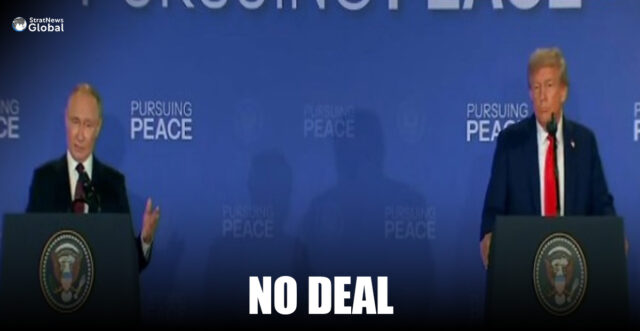President Donald Trump said Friday he will not immediately impose retaliatory tariffs on countries purchasing Russian oil, a decision closely watched by India, one of Moscow’s biggest crude customers. The announcement came after Trump met Russian President Vladimir Putin in Anchorage, Alaska, in their first in-person summit since his return to the White House.
Speaking to Fox News’ Sean Hannity after the meeting, Trump said: “Well, because of what happened today, I think I don’t have to think about that. Now, I may have to think about it in two weeks or three weeks or something, but we don’t have to think about that right now. I think, you know, the meeting went very well.”
Reports said the two leaders discussed a wide range of issues, including Ukraine, arms control, and global energy markets, but failed to reach any formal agreements or issue a joint communiqué. The summit, billed as a potential reset in U.S.-Russia ties, ended without substantive breakthroughs. As Putin arrived in Alaska, U.S. B-2 stealth bombers flew overhead in what was widely seen as a show of strength.
Putin described the talks as “frank” but stopped short of declaring them productive, while Trump insisted that “progress” had been made even in the absence of a concrete deal. Both outlets stressed that the war in Ukraine, nuclear arms control, and energy policy were the main sticking points.
India has particular interest in Trump’s decision to delay oil-related tariffs. New Delhi has significantly increased purchases of discounted Russian crude since 2022, a strategy it has defended as vital to its energy security. Trump has threatened tariffs on countries buying Russian oil as part of a broader campaign to squeeze Moscow’s revenues, including 25 per cent additional tariffs on India. By holding off, Trump has provided what analysts see as a temporary reprieve for New Delhi.
However, his own remark that the issue could be reconsidered within “two or three weeks” leaves open the prospect of renewed U.S. pressure. India therefore faces continued uncertainty over whether its energy imports will be targeted by future American measures.
Beyond energy, the Alaska summit yielded little progress on other global flashpoints. Al Jazeera reported that there was no agreement on Ukraine, while BBC noted that human rights and alleged Russian interference were scarcely mentioned. The outcome, both outlets suggested, signals a pause rather than a pivot in U.S.-Russia relations.
For India, the delay on oil tariffs is significant but potentially short-lived. Trump’s transactional approach to alliances and his willingness to revisit decisions quickly mean that New Delhi’s energy strategy — balancing cheap Russian oil with its deepening ties to Washington — remains fraught with uncertainty.
In a career spanning three decades and counting, Ramananda (Ram to his friends) has been the foreign editor of The Telegraph, Outlook Magazine and the New Indian Express. He helped set up rediff.com’s editorial operations in San Jose and New York, helmed sify.com, and was the founder editor of India.com.
His work has featured in national and international publications like the Al Jazeera Centre for Studies, Global Times and Ashahi Shimbun. But his one constant over all these years, he says, has been the attempt to understand rising India’s place in the world.
He can rustle up a mean salad, his oil-less pepper chicken is to die for, and all it takes is some beer and rhythm and blues to rock his soul.
Talk to him about foreign and strategic affairs, media, South Asia, China, and of course India.





